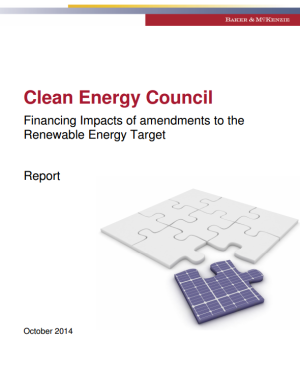
Since the Government have announced their ‘preliminary’ position on the RET, many studies have come out showing the impact of lowering the RET and applying exclusions to some industries. It is going to severely impact finances and could cause legal issues as well.
Changes to the RET is not only going to impact (or damage) our electricity sector but it also going to cause financial and legal mess according to analysis by law firm, Baker & McKenzie for the Clean Energy Council.
The report states that, “With any reduction to the RET, the scarcity and costs of capital (equity and debt) will increase in such a way as to make many existing and future projects financially unviable.” In addition, the price of renewable energy certificates (REC’s) is likely to fall by up to 30%. The change in the RET will most likely trigger a review of existing funded projects. Higher costs, higher risks and reduced REC’s returns does not paint a happy picture for investors.
Funding reviews may cause actual defaults or the need to write down renewable energy assets. This kind of adverse reaction to a change in the RET could result is a huge number of legal challengers and the quest of compensation.
Infigen Energy says a reduction in the RET will lead to a loss of revenue from its wind farms of $170 million, potential write downs, and may create issues for meeting loan repayments. Pacific Hydro has already announced significant write-downs.
“This report shows that a cut in the target of the scale proposed by the government would have far reaching and damaging consequences, and also that ensuring adequate compensation would be an extraordinarily complex and expensive task,” said Clean Energy Council Acting Chief Executive Kane Thornton. “A retrospective change to the policy would result in financial impairment and a substantial risk that existing projects and businesses would collapse, as well as inflicting damage on Australia’s reputation as a safe place to invest.”
Baker & McKenzie’s report also said this about the Warburton Review, “The RET Review Report fails to recognise that a lower RET target is likely to suppress merchant REC prices to such an extent that the bundled merchant price is well below breakeven price for operators and financially unattractive for any new owners.”
Large scale renewable energy projects already boast over $10 billion worth of investments which equates to many suffering the above financial consequences and resulting legal action.
Click here to download a copy of Baker & McKenzie’s ‘Financing Impacts of Amendments to the Renewable Energy Target.’
Tags: Baker & McKenzie, Clean Energy Council, electricity sector, Financing Impacts of Amendments to the Renewable Energy Target, impact of lowering the RET, Infigen Energy, Kane Thornton, large scale renewable energy projects, Pacific Hydro, REC, renewable energy assets, renewable energy certificates, Warburton review
